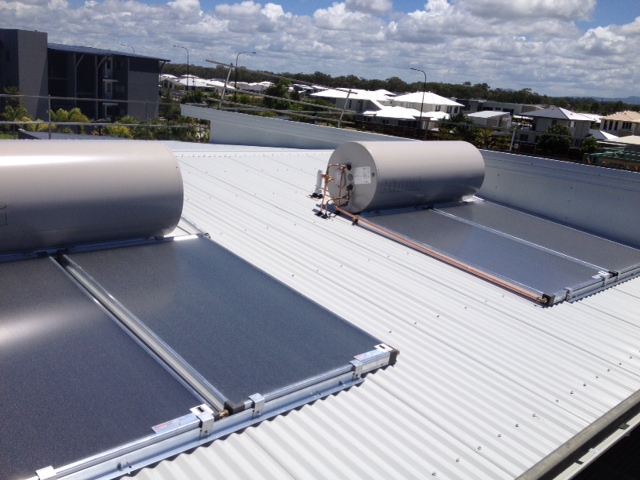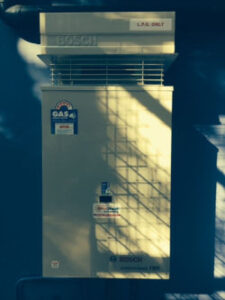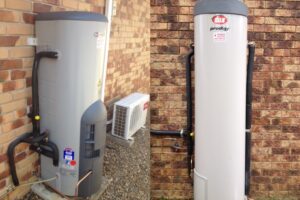Solar hot water systems are often an overlooked appliance in the home. That is until you receive an astronomical electricity bill. Considering that hot water accounts for approximately 25% of electricity used in Australian homes, your hot water system should be one of the first things you consider when looking to reduce your power bill. If you’re sick of huge power bills month after month, a solar hot water system could be the solution.
In fact, solar hot water systems can provide anywhere from 50 to 90% of a household’s hot water needs using free energy from the sun. As hot water specialists, we are constantly asked the same questions about solar hot water systems, That’s why we’ve created a list of frequently asked questions below for anyone looking to install a solar hot water system.
Note: all information provided is general and based on average water usage in Australia. For personalised advice, call your local hot water specialists at Sun City Hot Water & Plumbing on 1300 728 122.
How Does A Solar Hot Water System Work?

A solar hot water system is made up of five main components; solar collectors, a water tank, a heat exchanger, and an electric pump. The solar collectors are the black panels that you see on the roof of a house with solar hot water. As the name suggests, the solar collectors collect and trap heat from the sun which is used to heat the water.
An electric pump circulates water from the storage tank through the solar collectors where the heat exchanger transfers the trapped heat from the solar collector to the water. The now heated water is then pumped back into the water tank, ready for use. As the temperature of the water in the storage tank decreases as it naturally loses heat through the walls of the tank over time or when it is topped up with new cold water, the stored water will once again be pumped through the solar collector to be reheated.
Alternatively, a solar pump can be used to circulate the water in the system instead of an electric pump. However, the effectiveness of a solar pump is dependant on the weather and it may not work on cloudy or rainy days.
What Size Solar Hot Water System Do I Need?
The size of solar hot water system you need will depend on a number of factors including the size of the household, the average amount of hot water used per person, per day, and the location and climate in which the solar hot water system will be used.
Generally, the average water-efficient household in Australia uses around 75 litres per person every day. As a two metre solar panel will typically provide 150 litres of hot water a day, it is recommended that one solar panel of this size is needed for every two people in a household. So on average, a water-efficient family of four would need two two-metre solar panels to produce enough hot water for their average daily use.
However, the climate in which your solar hot water system is installed will directly affect the system efficiency and size needed. This is because, in warmer, sunnier climates, solar collectors are much more effective than those installed in colder climates. This means that if you live in an area with a warmer climate, you may require less solar collectors to meet your hot water needs.
How Much Does A Solar Hot Water System Cost?
The price of a solar hot water system depends on the size of the tank and the number of solar collectors required. Sun City Hot Water & Plumbing offer fully installed solar hot water systems from as low as $34.90 per week!*
For a full list of prices on hot water systems from all major manufacturers on the Australian market visit our individual manufacturer pages and prices.

*Price is for 2 years including a $500 deposit. TAP, Terms & Conditions Apply.
Does A Solar Hot Water System Work In Winter?
Most people know that solar hot water systems heat water using energy from the sun, so naturally the question of whether or not solar hot water systems work in winter follows. In short, yes they do work in winter. However, depending on the climate, the amount of hot water that can be heated using energy from the sun during cooler months may not be enough to meet the hot water needs of the household.
This is why solar hot water systems generally come with a gas or electric booster system, to top up the hot water when the heat collected from the sun is not enough.
Luckily, in the warmer climate we have here in Queensland, solar hot water systems can usually provide up to 90% of the required hot water for the year. And during those unexpected stormy days typical of our tropical climate, your booster system will ensure that you have hot water 365 days a year.
Do Solar Hot Water Heaters Use Electricity?
As mentioned earlier, solar hot water systems use an electric pump to circulate water through the system, which means that solar hot water systems do use electricity. However, the electricity used by the pump is negligible when compared to the electricity used by an electric hot water system.
Additionally, a solar hot water system may have a gas or electric booster system. Although this will use additional energy, the booster system will only be used when the solar collectors can’t harvest enough energy from the sun. So in the sunny climate of Queensland, this will also only account for a small amount of your annual electricity costs.
If you’re ready to make the switch to an environmentally friendly, solar hot water system and drastically reduce your energy bills, a solar hot water system could be the solution. Call Sun City Hot Water & Plumbing for quality solar hot water system installations at great prices!






